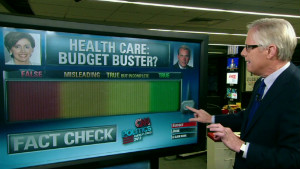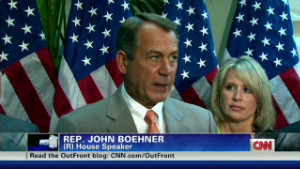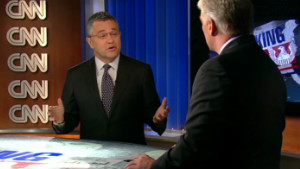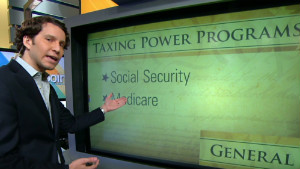Washington (CNN) -- The Supreme Court is set to release itsmuch-anticipated rulings on the constitutionality of the Affordable Care Act, the comprehensive health care law enacted two years ago.
The election-year rulings will not only guide how every American receives medical care but will also establish precedent-setting boundaries for how government regulation can affect a range of social areas. Your health and your finances could be on the line.
The outcome's possibilities are myriad: a narrow or sweeping decision? A road map to congressional authority in coming decades? Which bloc of justices, which legal argument will win the day?
Here are five scenarios -- strategic markers of a sort -- to watch as the high court weighs in on health care.
Wait another day?




The first question the high court tackled in its seven-hour marathon argument in March was something few observers had expected: It boiled down to whether the law's individual mandate is a "tax" that could prevent the court from considering the broader constitutional questions.
A little-known federal law -- the Anti-Injunction Act, dating back to 1867-- bars claimants from asking for a refund on a tax until it has been paid.
This "gateway" issue could render moot all the other pending health care questions if the justices think the minimum coverage requirement amounts to a tax.
Most justices seemed reluctant to take that route at the public argument session; they appeared eager to move on and address the broader, more vital constitutional questions. But citing the Anti-Injunction Act might give cautious justices a way out of deciding the explosive issue in an election year.
The majority might conclude that the political branches can best resolve the conflicts, at least for now, or that the matter can be handled after the November elections.
Some court watchers have called this the health care "sleeper issue" that could delay a decision on the constitutionality of the individual mandate for at least four years.
'Weak argument' = certain loss?
Baseball statisticians have nothing on the legal bar. After the arguments, wonky lawyers began counting the number of questions -- some hostile, some polite -- that the nine justices had tossed at opposing counsel. The somewhat squishy idea: the more questions a lawyer gets, the tougher it will be to prevail.
During the two hours of debate over the most closely watched aspect -- the individual mandate -- Solicitor General Donald Verrilli fielded more than 100 questions from the bench. His opponents -- private attorneys Paul Clement and Michael Carvin-- together faced only about 87. Verrilli, as the federal government's key lawyer before the high court, was defending the law from a coalition of 26 states seeking its nullification.
Verrilli, in the view of many court-watchers, had a bad day, struggling at times to find his voice and fend off a furious rhetorical assault by some skeptical members of the bench.
Chief Justice John Roberts was especially tough -- he interrupted Verrilli 23 times, but only on seven occasions on the other side.
As a former government and private advocate before joining the bench, the 57-year-old chief personally argued 39 cases at the high court and was widely regarded as among the best at making his case.
In 2004, while a federal appeals court judge, Roberts wrote a law review article explaining why query counts matter.
"The secret to successful advocacy is simply to get the [Supreme] Court to ask your opponent more questions," he wrote.
Divide and conquer -- 5-4 decisions
But a perceived "weak" argument or a voluminous volley of questions does not necessarily spell doom for the Obama administration. Getting nine intellectual hotshots with big egos to line up all the time along "expected" conservative-liberal lines is largely a myth.
Only eight of the 55 full opinions released by the court this term have been decided by a one-vote margin. Of course, the most contentious cases are normally the last to be finished, and the number of 5-4 rulings is likely to rise with the 15 or so petitions remaining on the docket. But closely "divided" decisions are not the norm overall.
Some legal and political scholars hold out hope the court will offer a united 9-0 voice behind the law's mandate, whatever the outcome, hoping such a decision would instill political and public confidence. They point to the 1954 Brown v. Board of Education case, in which the justices -- despite internal disagreements -- came together to unanimously strike down racial segregation in public facilities.
But this is a different court and health care in many ways is unique in the court's jurisprudence -- the scale, scope, and political underpinnings all make it especially complex and contentious.
To "swing" again
A recent "Time" magazine cover featured an intense, distinguished-looking older man, wearing glasses and the slightest of smiles. Most Americans would not recognize him if he walked down the grocery store aisle.
But, as with most hot-button Supreme Court cases, Justice Anthony Kennedy -- the moderate-conservative often referred to as the "swing" justice -- could decide whether the individual mandate stands.
So many are watching the native of Sacramento, California, who turns 76 next month, as well as another fellow conservative.
"With the four more liberal justices almost certain to vote to uphold the individual mandate, the administration is really hoping for the votes of either the chief justice, who signaled that he had questions for both sides, or the traditional swing vote in the court, Anthony Kennedy, who really was tough on the government lawyer but toward the end suggested that maybe insurance was special enough that he could vote to uphold the mandate," said Thomas Goldstein, SCOTUSblog.com publisher.
Even the perception that his vote might be in play builds Kennedy's power from within, and makes him one to watch.
R-E-S-P-E-C-T
Will the Supreme Court think big when issuing its decision -- sweeping pronouncements on the scope of federal vs. state power when it comes to the Commerce Clause? Or will a narrow approach be the way the justices reach consensus, some sort of workable solution that would give Congress clear guidance going forward -- the discretion to perhaps reshape health care in a way that meets constitutional scrutiny.
The key may be how the court's shaky conservative majority defines a long-standing bedrock principle: judicial deference.
Some states have long complained that their autonomy is being eroded by creeping federal intervention on spending matters.
Article 1 of the Constitution gives Congress the power to "lay and collect ... taxes to pay the debts and provide for the common defense and general welfare of the United States" and to "regulate commerce ... among the several states."
Such authority has long been broadly interpreted, including when imposing conditions on recipients, be they individuals or states.
Every student of government knows the Supreme Court has the power to declare acts of Congress unconstitutional. The precedent-setting 1803 Marbury v. Madison decision remains a cornerstone of federal court authority, codifying the idea of separation of powers as an enduring hallmark of the American system of government.
That power has been used wisely -- judiciously, if you will -- over the years. The courts by their nature are reluctant to frustrate the will of the political branches, which are accountable directly to the people.
It is a message President Obama himself offered just days after oral arguments in the health care cases were completed.
"The point I was making is that the Supreme Court is the final say on our Constitution and our laws, and all of us have to respect it, but it's precisely because of that extraordinary power that the court has traditionally exercised significant restraint and deference to our duly elected legislature, our Congress," said the former law school professor. "And so the burden is on those who would overturn a law like this."
Some conservatives interpreted those and remarks the day before as political interference in an independent branch of government.
"The president crossed a dangerous line this week, and anyone who cares about liberty needs to call him out on it," Senate Minority Leader Mitch McConnell, R-Kentucky, said. "The independence of the court must be defended. Regardless of how the justices decide this case, they're answerable, above all, to the Constitution they swore to uphold. The fact that this president does not appear to feel similarly constrained to respect their independence doesn't change that one bit. So respectfully, I would suggest the president back off."
The justices themselves are not prepared to back off when they issue their decision. Nor are they likely as individuals to back into the political firestorm sure to follow. Their ruling will speak for itself -- however big, small, or confusing it may be. After that, the justices will again retreat largely from public view, to begin a three-month recess.